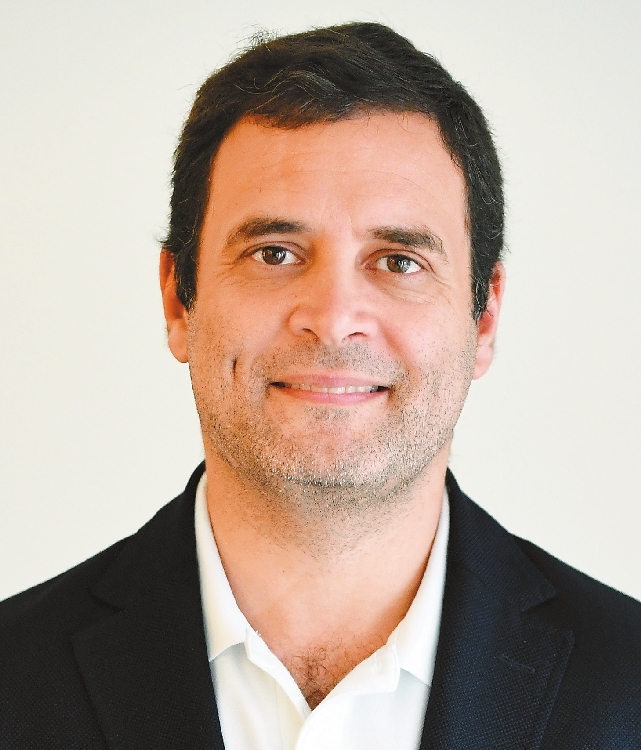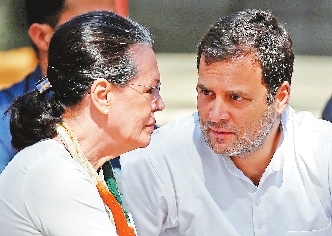

RAHUL GANDHI, vying to become the latest prime minister from the powerful Nehru-Gandhi political dynasty that has dominated Indian politics for decades, has worked hard to shed his image as an entitled footloose princeling and political lightweight. But the great-grandson, grandson and son of three past Indian prime ministers still faces a tough task beating Prime Minister Narendra Modi in elections. No relation to independence hero Mahatma Gandhi, Rahul was born in 1970 when his grandmother Indira Gandhi — daughter of India’s first prime minister, Jawaharlal Nehru — was prime minister. In 1984, Indira was shot dead by her Sikh bodyguards and she was succeeded by her son Rajiv Gandhi, Rahul’s father. Rajiv was himself assassinated in 1991 by a Tamil suicide bomber when Rahul was 20. “In my life, I have seen my grandmother die, I have seen my father die, I have seen my grandmother go to jail, and I have actually been through a tremendous amount of pain as a child,” Gandhi said in a 2014 interview with an Indian TV channel. After 15 years in politics, Gandhi is beginning to articulate a vision for India that some observers say is making him a credible leader. The 48-year-old has often been the object of derision from political rivals, who accuse him, despite his pedigree, of being a lightweight. In contrast to Modi, a tea seller’s son who went on to become India’s leader, Gandhi inherited his power, making him an easy target of charges of nepotism and dynasty politics. Critics have often described him as the “reluctant prince” who even after becoming a lawmaker, has for a time distanced himself from political life, refusing to even call himself a candidate for prime minister. In a previous television interview, Gandhi gave the impression that he was leading the party because his birth gave him no choice, rather than because of any ambition. Born on June 19, 1970, Gandhi went to the finest Indian schools, and was enrolled at Harvard but dropped out after a year, following his father’s death. He later graduated from Rollins College, Florida and in 1994 earned a master’s degree from Cambridge before returning to work in Mumbai in 2002. While in his 20s he lived in London, where he worked at a management consultancy for a time. His Italian-born mother Sonia Gandhi, widow of Rajiv, took charge of the Congress party in 1998 before handing over the reins to Rahul, her first-born, in 2017. There had also been questions about how eager he was to embrace this role. Rahul was seen as a shy man whose interests lay more in cricket matches and the outdoors than in political life. His charismatic and popular sister Priyanka Gandhi Vadra was thought to be more likely to take over the family’s mantle of power. His decision to enter formal politics before the 2004 general election therefore took many by surprise. That year, Gandhi stood for parliament and won the traditional family constituency of Amethi in Uttar Pradesh, which his father had once held. In September 2007, Rahul was named as the party’s secretary general, with his mother Sonia remaining as president, and in January last year, he was appointed the vice president of the party. He represents the fourth generation of the Nehru-Gandhi dynasty that has led the Congress party, and India, for much of the time since independence from Britain in 1947. Why Rahul, rather than Priyanka, answered the party’s call for a new generation of Gandhis is still not fully clear. Many within the Congress party saw his move into politics as positive, although the decision was seen by some as highlighting the party’s lack of alternatives and its continuing reliance on the Nehru-Gandhi family for leadership and direction. Whatever the concerns, expectations were high that he would play a major role in the government and the party. Despite his “dark horse” image, he is said by some analysts to have a detailed political knowledge and to be a practiced backroom operator. Although he turned down previous roles to take a prominent role in the party, by 2008 he had kicked off a campaign called the “discovery of India,” aimed at winning over hearts and minds and projecting himself as a future leader. In his campaigning in Uttar Pradesh in the 2012 state elections, he addressed more than 200 rallies, slept in villagers’ huts and even grew stubble to give himself more of a “man of the people” look. In 2007, leaked U.S. diplomatic cables said Rahul was viewed as an “empty suit” and “lightweight,” with little known about his political beliefs — if he had any. But by 2009, the U.S. assessment was now that Gandhi sounded like a “practiced politician who knew how to get his message across and ... was comfortable with the nuts and bolts of party organization and vote counting.” “He was precise and articulate and demonstrated a mastery that belied the image some have of Gandhi as a dilettante,” a leaked cable by senior U.S. diplomat Peter Burleigh said. After Modi’s Bharatiya Janata Party (BJP) crushed Congress at the 2014 election, Gandhi set about reviving and rejuvenating the party, while keeping older hands on side. A speech in the lower house last year drew widespread applause and forced political pundits to take notice. He ended it by giving an uncomfortable-looking Modi a surprise hug. He has also, in contrast to the Hindu nationalist Modi, reached out to Muslim voters and stressed his secular credentials, and also to women, promising to bring legislation setting aside seats in parliament for them. Last December, Congress secured victory in three key state elections, including in Modi’s northern Indian “cow belt” heartland, suddenly making Gandhi look like a serious contender. During the campaign for the election — which will wrap up May 19, with results four days later — Gandhi has attacked Modi’s record on farmers, jobs and his close ties to business. “Across India, people are frustrated and angry. Mr. Modi is attempting to use hyper-nationalism to divert the attention of the people,” he said in a recent interview to the Kolkata-based Telegraph newspaper. “But the people of India are not foolish. They can see through this game,” he said. Election adverts show him hugging an emaciated peasant woman, while Gandhi’s leftist manifesto pledges to end abject poverty by 2030 and give cash transfers to 50 million families. But Modi is no pushover, using traditional and social media, as well as tub-thumping speeches, to dominate the headlines. Modi has capitalized on India and Pakistan’s tit-for-tat airstrikes in February to appear as the patriotic “chowkidar” (watchman) of India. Gandhi’s attempts to score points with allegations of dodgy dealings related to India’s purchase of Rafale jets from France have also failed to stick with voters in a big way, opinion polls have suggested. And at the same time Modi seldom misses an opportunity to contrast his own humble beginnings with his silver-spoon adversary, deriding Gandhi as “shahzada” (crown prince). Gandhi “appears to be clinging to the socialist ideas of his grandmother and doesn’t realize that people have changed, that even the poor have changed,” said Parsa Venkateshwar Rao, a veteran journalist and political commentator. Gandhi brought his sister Priyanka into the party, appointing her to oversee a post in the eastern part of Uttar Pradesh that includes Varanasi, the Hindu holy city where Modi is up for re-election as a member of parliament. Her popularity has drawn huge crowds to campaign events, but it may not be enough to counter her brother’s perceived sluggishness. Whatever the result of the election, Gandhi is now seen as a feisty opponent, most recently in an interview with the daily Indian Express newspaper. “That destruction of the idea of an invincible Mr. Modi, that destruction of the lie of Mr. Modi, is primarily the work of the Congress party,” he said.(SD-Agencies) | 
